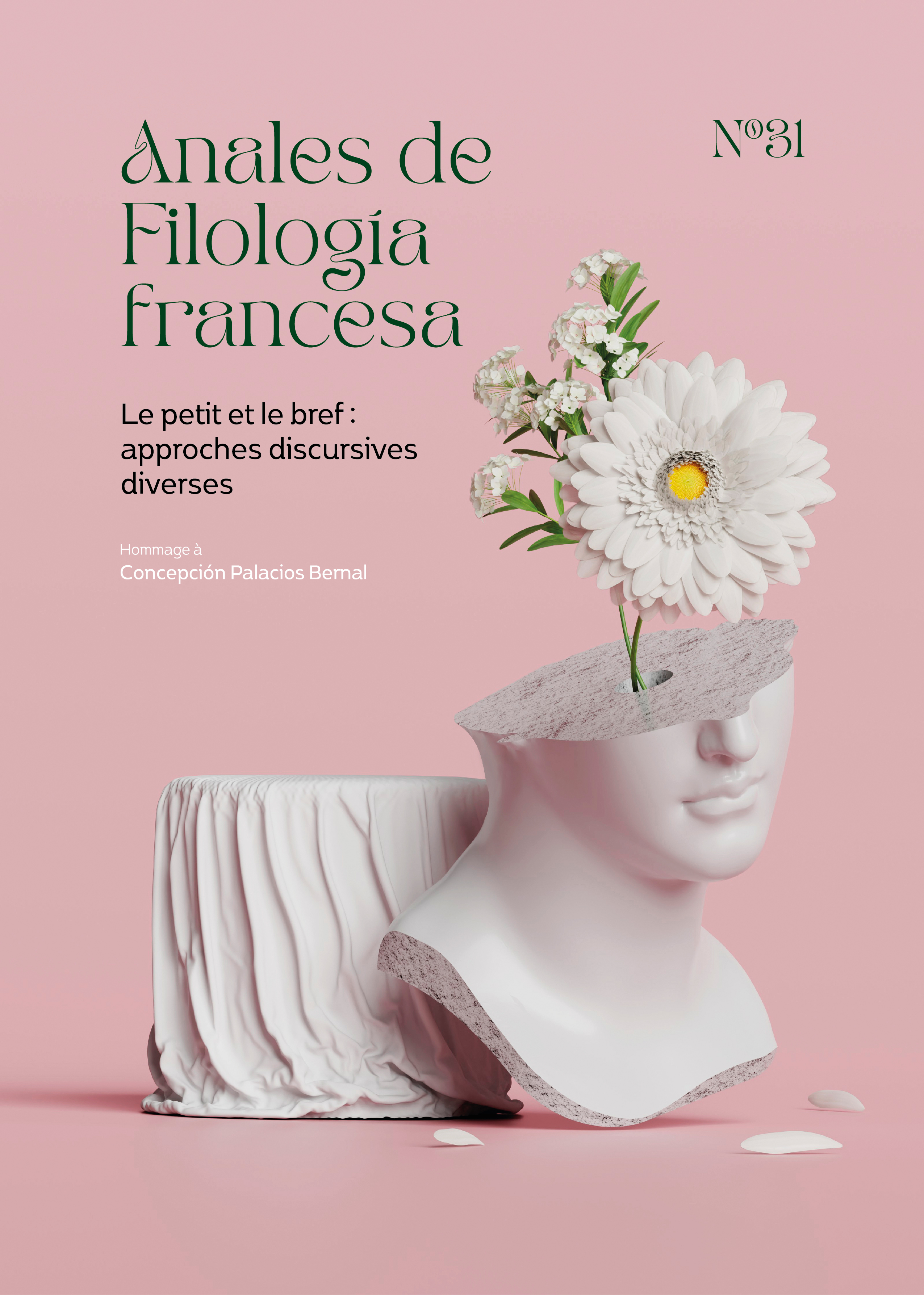Singular Brevities: Effects and Variations of the Brief in Henri Michaux’s Qui je fus and Tranches de savoir
Abstract
Based on the notion of the brief as defined by Gérard Dessons, this article provides a poetic approach to the effects of brevity in three collections of short statements by Henri Michaux: “Prédication”, “Principes d'enfant” and “Tranches de savoir”. The aim of the analyses is to show, in keeping with the nominalism of Dessons' theory, that brevity exists only in singular discursive occurrences and that it produces different effects in each work, depending on the particular discursive system that it characterises. We therefore observe how, in the context of collections of short statements that define themselves in relation to the possibility (contested or not) of a gnomic or injunctive sapiential enunciation, brevity can generate an obscuring effect which, for the subject led to coenunciate the collected statements, constitutes a questioning of the obviousness of the referential and cultural universe of reference in “Prédication”, an alternative to the traditional rhetoric of knowledge in “Principes d'enfant” or the trial of an oriented spiritual exercise in “Tranches de savoir”.
Downloads
-
Abstract346
-
PDF (Français )470
References
BELLOUR, Raymond. 2011. Lire Michaux. Paris, Gallimard.
BERRANGER, Marie-Paule. 1988. Dépaysement de l’aphorisme. Paris, José Corti.
BUTOR, Michel. 1999. Le Sismographe amoureux. Paris, Editions de la Différence.
COSTE, Claude. 1987. “Michaux moraliste dans Poteaux d’angle” in Grouix, Pierre et Maulpoix, Jean-Michel (éds.). Henri Michaux: Corps et savoir. Lyon, ENS Éditions, 149-172. Web. <http://books.openedition.org/enseditions/21010>.
DESSONS, Gérard. 2015. La Voix juste. Essai sur le bref. Paris. Editions Manucius.
FINTZ, Claude. 1987. “Sagesse de Michaux : entre posture et imposture : Lecture de la première section de Poteaux d’angle” in Grouix, Pierre et Maulpoix, Jean-Michel (éds.). Henri Michaux : Corps et savoir. Lyon, ENS Éditions, 173-190. Web. <http://books.openedition.org/enseditions/21010>.
FINTZ, Claude. 1996. Expérience esthétique et spirituelle chez Henri Michaux : La Quête d'un savoir et d'une posture. Paris, L’Harmattan.
JENNY, Laurent. 2012. “Styles d’être et individuation chez Henri Michaux” in Macé, Marielle (dir.), Après le bovarysme, Fabula-LhT, n°9 mars 2012. Web. <https://www.fabula.org:443/lht/9/jenny.html>.
LAUTRÉAMONT. 1973. Œuvres complètes. Paris, Gallimard.
MACE, Marielle. 2016. “La vie se débat dans ses formes”. Conférence prononcée à Genève dans le cadre du colloque “Ethiques d’Henri Michaux”. Web: <https://www.youtube.com/watch?v=jpMxUpWcP9M>
MAINGUENEAU, Dominique. 2012. Les Phrases sans textes. Paris, Armand Colin.
MAULPOIX, Jean-Michel. 1987. “Une morale par des traits” in Grouix, Pierre et Maulpoix, Jean-Michel (éds.). Henri Michaux : Corps et savoir. Lyon, ENS Éditions, 191-196. Web. <http://books.openedition.org/enseditions/21020>.
MAULPOIX, Jean-Michel. 1993. Henri Michaux, passager clandestin. Paris, Champ Vallon.
MAULPOIX, Jean-Michel. 2019. “Skieur au fond d’un puits” in Revue d’Histoire Littéraire de La France, vol. 119, n° 4, 865–72. https://www.jstor.org/stable/26853462.
MESCHONNIC, Henri. 2007. “Chaque réponse est une question”, revue Temporel, n°3: < https://temporel.fr/-Le-rythme-de-la-marche >
MESCHONNIC, Henri. 2008. Dans le bois de la langue. Paris, Éditions Laurence Teper.
MEYDIT-GIANNONI, Valentine. 2019. Prescrire, écrire. Pour un portrait du poète en moraliste ? Michaux, Char, Jabès et Jaccottet. Thèse de doctorat. Sorbonne Université.
MICHAUX, Henri. 1927. Qui je fus. Paris, Editions de la Nouvelle revue française.
MICHAUX, Henri. 1938. Lointain intérieur. Paris Gallimard.
MICHAUX, Henri. 1946. Epreuves, exorcismes. Paris, Gallimard.
MICHAUX, Henri. 1950. Passages. Paris, Gallimard.
MICHAUX, Henri. 1954. Face aux verrous. Paris, Gallimard.
MICHAUX, Henri. 1998. Œuvres complètes, tome 1. Paris, Gallimard.
MICHAUX, Henri. 2001. Œuvres complètes, tome 2. Paris, Gallimard.
MORET, Philippe, 1997. Tradition et modernité de l’aphorisme: Cioran, Reverdy, Scutenaire. Genève, Droz.
MOURIER, Maurice. 1976. “Michaux sage/mage” in Dadoun, Roger (éd.). Ruptures sur Henri Michaux. Paris, Payot, 209-257.
PERROT, Mathieu. 2020. “Écriture d’épargne. Le raccourci dans la poétique d’Henri Michaux” in Voisin, Patrick (dir.). Réinventer la brachylogie. Paris, Classiques Garnier, 217-231.
ROGER, Jérôme. 2010. “Moraliste comme Henri Michaux : exception ou tradition française?”, in Huet-Brichard, Marie-Catherine, Marot, Patrick et Novaković, Jelena (éds.). Les moralistes modernes. URL: http://www.fabula.org/colloques/document1357.php, page consultée le 02 mai 2023.
ROUKHOMOVSKY, Bernard. 2001. Lire les formes brèves. Paris, Dunod.
VRYDAGHS, David. 2008. Michaux l'insaisissable : socioanalyse d'une entrée en littérature. Genève, Droz.
TROTET, François. 1992. Henri Michaux ou la sagesse du vide. Paris, Albin Michel.
- 12-12-2023 (5)
- 12-12-2023 (4)
Las obras que se publican en esta revista están sujetas a los siguientes términos:
1. El Servicio de Publicaciones de la Universidad de Murcia (la editorial) conserva los derechos patrimoniales (copyright) de las obras publicadas, y favorece y permite la reutilización de las mismas bajo la licencia de uso indicada en el punto 2.
2. Las obras se publican en la edición electrónica de la revista bajo una licencia Creative Commons Reconocimiento-NoComercial-SinObraDerivada 3.0 España (texto legal). Se pueden copiar, usar, difundir, transmitir y exponer públicamente, siempre que: i) se cite la autoría y la fuente original de su publicación (revista, editorial y URL de la obra); ii) no se usen para fines comerciales; iii) se mencione la existencia y especificaciones de esta licencia de uso.
3. Condiciones de auto-archivo. Se permite y se anima a los autores a difundir electrónicamente las versiones pre-print (versión antes de ser evaluada) y/o post-print (versión evaluada y aceptada para su publicación) de sus obras antes de su publicación, ya que favorece su circulación y difusión más temprana y con ello un posible aumento en su citación y alcance entre la comunidad académica. Color RoMEO: verde.










